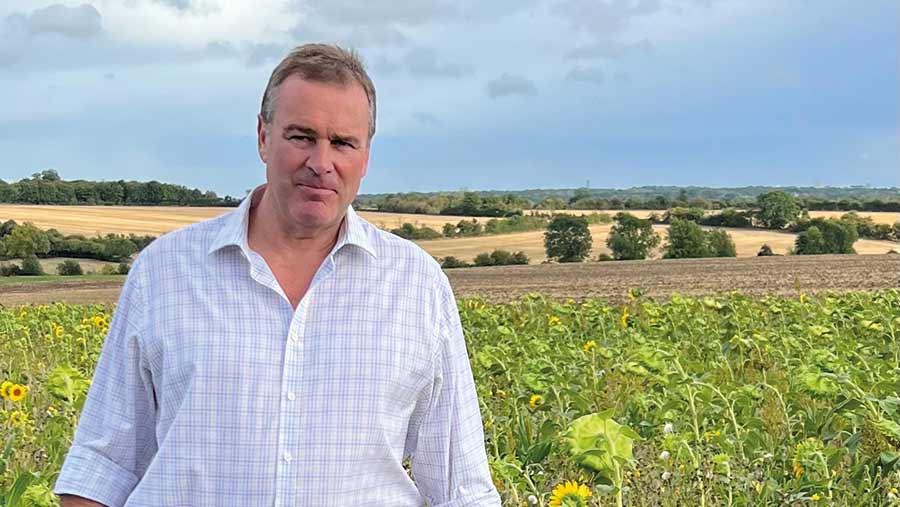Anger and frustration’ as RPA forced to repay penalties
 William Sawbridge estimates the cost to his business at £40,000 © William Sawbridge
William Sawbridge estimates the cost to his business at £40,000 © William Sawbridge Buckinghamshire farmer William Sawbridge has expressed his anger and frustration at his treatment by the Rural Payments Agency (RPA) in a dispute over his two agri-environment schemes.
Mr Sawbridge, who farms 1,516ha at Lodge Farm, Castlethorpe, just north of Milton Keynes, has land committed to both Higher Level Stewardship (HLS) and Mid-tier Countryside Stewardship (CS).
The disputes date back to July 2020, when an RPA inspector alleged various discrepancies in his compliance with the scheme rules.
See also: Farmers reveal ‘brutal’ treatment at hands of RPA
Higher Level Stewardship
With regards to the HLS scheme, the inspector cited various “overclaims” on areas put down to wild bird seed mix (HF2NR), and suggested maize had been included, which was not admissible.
This resulted in penalties totalling £34,922.
This was contested by Mr Sawbridge and his agent, Mel Holloway, who said that, while he had made an error by moving some plots around without informing the RPA, the inspector had failed to measure all the plots.
Had she done so, this would have explained any discrepancies.
The inspector had also mistakenly identified dwarf sorghum, which had been planted to enhance his bird seed plots, as maize.
In its defence, the RPA said it was not informed that some of the plots had been moved, so was not able to take them into account.
As the agreement was for “non-rotational” bird mixes, and they had been moved without permission, the RPA said its penalties were justified.
Countryside Stewardship
With regards to Mr Sawbridge’s Mid-tier CS scheme, the RPA initially applied penalties of £9,450 in relation to alleged overclaims on five parcels of two-year sown legume fallows (AB15 plots).
According to the RPA, this was due to miscalculations when planting the areas. It also pointed to discrepancies in buffer strip widths, which led to further deductions.
But Mr Sawbridge said the parcels in question included multiple options, suggesting the area measurements provided by the RPA inspector did not account for the full area of the parcel concerned.
Some areas of AB15 were smaller than intended due to heavy rain at the time of planting, but this had been offset by other option areas.
Questions were also raised about the accuracy of the GPS equipment used by the RPA, which it later admitted “is sometimes 1-2m positionally out in some rural areas”.
Appeal
Both of Mr Sawbridge’s complaints were rejected by the RPA, but a full Independent Agricultural Appeals Panel hearing on 7 April this year reached a different conclusion.
It recommended that both schemes should be subject to a new inspection “as the only practical way to determine whether or not the RPA have applied the scheme rules correctly”.
However, the dispute was then escalated to ministerial level, with the then Defra farming minister Victoria Prentis overruling the appeals panel, saying further inspections were “unlikely to provide substantive evidence”.
Instead, she instructed the RPA to write off the penalties for both the HLS scheme (£34,922) and the Mid-tier CS scheme (£9,450).
‘Out of pocket’
While it is understood the money has recently been paid back by the RPA, Mr Sawbridge told Farmers Weekly the whole experience had left him “angry, disillusioned and out of pocket”.
“The allegations that they made were totally incorrect and have cost me a lot of money, with Mid-tier payments worth £117,000, HLS payments worth £21,000 and basic farm payments worth £205,000 also being withheld, which totally destroyed my cashflow for two years.
“I believe this exercise has cost the business approximately £40,000 – not including my time.”
Ms Holloway also pointed to the lack of interest payments on the money withheld, and the lack of reimbursement for the expense it took for Mr Sawbridge to prove his innocence.
“In total we have sent in the region of 50 emails requesting evidence and updates, often not getting replies,” she said.
“We have also had to manually change the HLS and Mid-tier claims each year, because the RPA had reduced the areas as per the inspection findings, even though they were subject to appeal.
“The length that this all took also meant that the business did not have the opportunity to extend the HLS agreement, and so had to start a new application at additional expense.”
Ms Holloway said her concern was that she had seen similar things happen to other farmers who were either without the resources to appeal or too concerned about the consequences of doing so.
The RPA declined to provide any further comment on the case.
